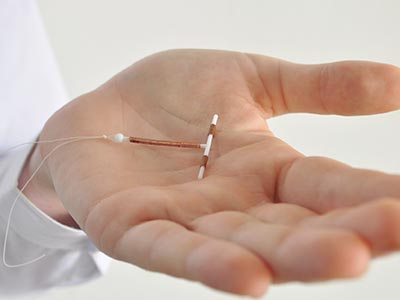Get Help Now
“I truly could not speak highly enough of FPA Long Beach and the staff here. I was able to have my IUD replacement done under general anesthesia when other clinics wanted me to do it awake and with no pain management, despite having an excruciatingly painful and frankly traumatic experience the first time I got an IUD. FPA takes women’s pain seriously and treated me with kindness and empathy in every interaction. The only downside was a long wait, but I will take that any day for the care that I received.”
How does an IUD prevent pregnancy?
An intrauterine device (IUD) is one of the most effective and convenient forms of long-term birth control available. It prevents pregnancy by making it difficult for sperm to reach & fertilize an egg.
Hormonal IUDs such as Mirena® and Kyleena® release small amounts of progestin, which thickens cervical mucus and thins the uterine lining to stop sperm from reaching the egg. Paragard®, a non-hormonal IUD, uses copper to create a sperm-repelling environment and can also prevent implantation if fertilization occurs.
Mirena® and Paragard® are both approved for use as emergency contraception when inserted within five days after unprotected intercourse, offering over 99.9% effectiveness at preventing pregnancy.
What are the benefits of IUDs?
Choosing an IUD at FPA Women's Health means choosing convenience, effectiveness, and control. IUDs provide long-term protection and can last for different durations depending on the type: five years for Kyleena®, eight years for Mirena®, and ten years for Paragard®.
Key benefits of IUD birth control include:
- Highly effective: over 99% protection from pregnancy
- Low maintenance: no daily pill or routine required
- Reversible: fertility typically returns quickly after removal
- Lighter or no periods (with hormonal IUDs)
- Quick insertion and removal by an experienced provider
- May Reduce the risk of certain cancers
Once inserted, your IUD begins working immediately or within seven days, depending on the model. It's a reliable, "set-it-and-forget-it" birth control solution trusted by millions of women across California.
What can I expect when I get my IUD?
Your IUD insertion appointment at FPA Women's Health is quick and personalized to your comfort level. During the procedure, your provider inserts a speculum, then gently places the IUD through the cervix into the uterus using a thin, flexible tube. A small string remains at the cervix opening, allowing easy future removal.
Most insertions take only a few minutes. Some patients experience mild cramping, while others feel minimal discomfort.
IUD Insertion Under Anesthesia
At FPA Women's Health, we're proud to offer IUD insertion under anesthesia, and are one of the few providers in California to make this option widely available. We understand that pain and anxiety are common concerns, so our team provides multiple anesthesia options to ensure a comfortable, stress-free experience:
- Local Anesthesia*: A numbing medication injected into cervix to reduce discomfort during insertion. PLEASE NOTE*: Local anesthesia is offered at all clinic locations and service days.
- Oral or IV sedation*: Light Sedation options that help you relax or rest comfortably throughout the procedure. PLEASE NOTE*: Sedation options are only available only at select clinic locations and on specific service days.
- IUD insertion under anesthesia (fully asleep)*: Performed in a controlled, safe surgical setting for a completely pain-free IUD experience. PLEASE NOTE*: Full anesthesia options are only available only at select clinic locations and on specific service days.
Whether you're nervous about discomfort, have had a difficult experience in the past, or simply want the most comfortable option available, our experienced medical team will discuss all pain-management and anesthesia choices with you during your visit.
Why choose FPA Women's Health for your IUD?
With decades of experience in women's reproductive health, FPA Women's Health offers expert, compassionate care tailored to your needs. We perform thousands of IUD insertions every year across our convenient clinic locations throughout California
Our Patients choose FPA for:
- Comfort-focused procedures with advanced anesthesia options
- Experienced providers specializing in IUD and contraceptive care
- Flexible scheduling and same-week appointments
- Affordable pricing and most insurances accepted.
While IUDs do not protect against sexually transmitted infections (STIs), they remain among the best long-term birth control options for those in a stable relationship or who want a highly reliable method of contraception.
To learn more about IUD birth control options, including IUD insertion under anesthesia and pain-free IUD procedures in California, call your nearest FPA Women's Health clinic or book an appointment online today.

Financial Assistance Available!
We are proud to offer immediate, on-site financial assistance for those without insurance or the ability to pay. Tap/Click for more!
